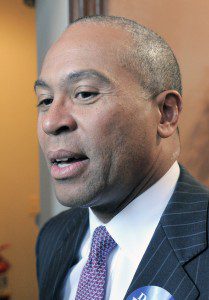STEVE LeBLANC, Associated Press
BOSTON (AP) — Gov. Deval Patrick has unveiled a $100 million proposal he says will spur economic growth by improving job opportunities, expanding the state’s international marketing efforts and ending barriers to high-tech workers who want to change jobs.
Patrick’s plan released Thursday would eliminate so-called non-compete agreements designed to discourage workers in high-tech companies from quitting and taking their skills to a competitor.
Patrick said the agreements stifle competition. He said tougher protections for trade secrets is a better solution.
Patrick’s plan would also step up investments in the state’s older, financially strapped municipalities known as Gateway Cities.
Patrick wants to promote market-rate housing in the cities, speed the cleanup of old manufacturing properties for reuse, and give cities and towns greater control over the number of liquor licenses in their communities by ending existing statutory limits.
“I welcome this news,” said Westfield Mayor Daniel M. Knapik Friday morning. “Like many older cities, known as Gateway Cities, Westfield has struggled with financial cost and complexity of cleaning up former industrial sites.”
“Fortunately, we have very few, and presently we have been successful in addressing the contamination at the Elm Street site with state assistance,” Knapik said. “A key to slowing suburban sprawl and preserving our open space is to better utilize the space in city centers.”
“This, of course, costs money, as there are a variety of obstacles in converting older downtown properties into housing,” he said. “These obstacles can include, structural, environmental, accessibility issues, and parking, all of which we have seen our local property owners struggle with.”
“A renewed and real effort by the state to address these costly issues, will go a long way in providing additional attractive housing opportunities downtown which will in turn allow for additional customer base for the local merchants,” he said.
Patrick defended the push to eliminate non-compete agreements, despite what he characterized as “some resistance to it in the tech community.”
He said the best way to ease that resistance is to bulk up the state’s existing protections against the sharing of intellectual property.
“In California, another tech hub, they don’t have non-competes and they’re doing pretty well,” Patrick said during his monthly radio show on WGBH-FM. “We want to enable that same free flow of talent in an innovation hub here in Massachusetts which is booming and it ought to have as few restraints on it as possible.”
Chris Anderson, president of the Massachusetts High Tech Council, said employers who spend money training and educating employees have legitimate concerns if an employee opts to work for a competitor.
“The appropriate place to address concerns of the large employers is to strengthen trade secrets protections,” he said.
Anderson said the focus on intellectual property protections rather than non-compete agreements is in part an acknowledgement of the fast-moving nature of the technology landscape in Massachusetts.
He said there are about 400 technology firms headquartered in Massachusetts with revenues over $20 million compared with over 10,000 firms with revenues under $20 million, with most under $5 million. The diverse nature of that landscape is a powerful economic engine for Massachusetts, he said.
Patrick unveiled his package at an economic development summit in Newton.
Patrick says he wants to revamp the state’s research and development tax credit program, encourage more high-tech companies to hire interns, and expand the state’s international marketing efforts to increase tax revenue related to foreign travel and business for tourism-related industries.
The plan also calls for a global entrepreneur-in-residence program, which Patrick said would retain and attract entrepreneurs dedicated to creating jobs in Massachusetts.
The program would allow qualified, high-skilled, international students in Massachusetts to stay after graduation if they are starting or growing a business, the governor said.
The program, to be administered by the Massachusetts Technology Collaborative, would place selected students who are eligible for special work visas but unable to get one due to a federal cap as entrepreneurs-in-residence at public and private institutions.
Patrick said the plan would be paid for through a combination of capital budget and general fund expenditures.
For members of Boston’s minority caucus, however, Patrick’s proposal is a classic case of “too little too late.”
“The cynic in me asks why you’re proposing this now rather than the last few years,” said State Senator Don Humason, Jr. (R-Westfield). “I’m all about promoting the Commonwealth, but I don’t like it when government picks winners, because thats when a solar company takes $50 million of state money, and then goes out of business.”
THe idea of eliminating the state’s no-compete agreement is something Humason said he needs to research more, but that it concerns business owners that he’s spoken to.
“I was approached by a business owner who said they train people for specific services, and if the agreement is eliminated, what’s stopping them from taking our secrets and knowledge, starting their own business, and taking our customers?” he said.
Humason said he is willing to listen to Patrick’s proposal, but with the House and Senate now firmly entrenched in the budget process, he fears whatever positives the proposal has won’t receive their due dilligence.
“It’s the right issue (promoting Massachusetts) but the wrong time,” he said. “It would’ve been most appropriate to bring this up when he rolled out his budget. But we should promote a climate that supports anyone who hires someone, makes something or provides a service (in Massachusetts).”


